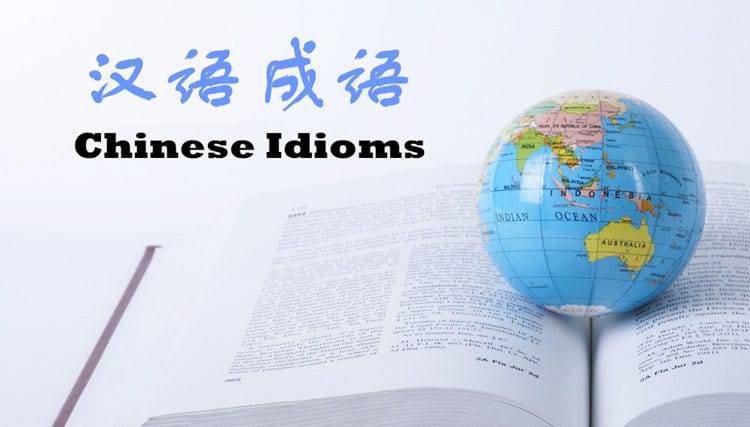What is the Chinese idiom, or Chéngyǔ? It’s a type of traditional Chinese idiom typically made up of four characters, taken from various stories of ancient China. All Chinese idioms have their own original story and express a particular meaning.
Even to local Chinese people, using idioms during the conversion is quite a high-level language skill. Do you want to make your Chinese language to another level? Below you’ll find a list of the 42 most common and useful Chinese idioms for different situations. there are including the meaning and examples for you to better understand.
Chinese idioms for angry

怒火中烧 [nù huǒ zhōng shāo]
This idiom’s meaning is Anger burns in my heart, which is very intense. (怒火在心中燃烧,形容愤怒的情绪非常激烈)
Idioms Example: When he knows the thing, he is nù huǒ zhōng shāo. (当他直到这件事后,他气得怒火中烧。)
怒不可遏 [nù bù kě è]
This idiom’s meaning is unable to restrain one’s anger (愤怒得不到抑制,形容愤怒到极点)
Idioms Example: In the face of the atrocity of the counter-revolution, the revolutionaries were nù bù kě è. (面对反革命的暴行,革命志士怒不可遏)
火冒三丈 [huǒ mào sān zhàng]
This idiom’s meaning is to get really angry, like fire. (形容怒气特别大,大到要冒火了。)
Idioms Example: You have a bad temper, you’re so easy to get huǒ mào sān zhàng. (你的脾气很差,动不动就火冒三丈。
大发雷霆 [dà fā léi tíng]
This idiom’s meaning is to be furious, blaming people intensively. (比喻大发脾气,高声斥责别人。)
Idioms Example: He dà fā léi tíng when he learns that his son is playing truant. (他得知他的儿子逃学后大发雷霆。)
恼羞成怒 [nǎo xiū chéng nù]
This idiom’s meaning is to be ashamed into anger (idiom); to fly into a rage out of humiliation. (由于羞愧和恼恨而发怒)
Idioms Example: After listening to everyone’s criticism, instead of accepting it modestly, he became nǎo xiū chéng nù. (听了大家的批评,他非但没有虚心接受,反而恼羞成怒。)
Chinese idioms for beauty

闭月羞花 [bì yuè xiū huā]
This idiom’s meaning is her beauty would shut out the moon and put the flowers to shame; very beautiful. (形容她的美貌美得让月亮也躲起来了,让花儿都不好意思绽放了。)
Idioms Example: Both of them look bì yuè xiū huā, so beautiful. (她们俩都长得闭月羞花,真的很美。)
国色天香 [guó sè tiān xiāng]
This idiom’s meaning is national grace, divine fragrance, and outstanding beauty. (形容女子的美丽,全国范围内都是数一数二的。)
Idioms Example: They are all full of energy and everyone is guó sè tiān xiāng. (她们个个精神抖擞,都长得国色天香。)
倾国倾城 [qīng guó qīng chéng]
This idiom’s meaning is devastatingly beautiful, which is capable of causing the downfall of a city or state. (形容妇女容貌极美。)
Idioms Example: She is qīng guó qīng chéng indeed, I can’t wait to see her again. (她长得真的是倾国倾城,我迫不及待再想见到她。)
秀色可餐 [xiù sè kě cān]
This idiom’s meaning is graceful; (of women) gorgeous; a feast for the eyes. (形容女子姿容非常美丽或景物非常优美。)
Idioms Example: This girl is very beautiful. She is so xiù sè kě cān. (这位姑娘非常漂亮,真可说是秀色可餐了。)
亭亭玉立 [ tíng tíng yù lì ]
This idiom’s meaning is slim and graceful; tall and erect. (形容美女身材修长或花木等形体挺拔。)
Idioms Example: The tíng tíng yù lì girl on the stage is a singer from Cina. (舞台上这位亭亭玉立的姑娘是中国的歌手)
Chinese idioms for thanks

感激不尽 [ gǎn jī bù jìn ]
This idiom’s meaning is can’t thank sb enough. (感激的心情没有穷尽。形容非常感激。)
Idioms Example: I am gǎn jī bù jìn to his generous financial aid. (我对他的资助感激不尽。)
感激涕零 [ gǎn jī tì líng ]
This idiom’s meaning is to shed tears of gratitude, moved to tears. (因感激而流泪。形容感激异常。)
Idioms Example: For his help, the family of the rescued primary school students is really gǎn jī tì líng. (对于他的救命之恩,被救的小学生全家真是感激涕零。)
感同身受 [ gǎn tóng shēn shòu ]
This idiom’s meaning is a polite expression of gratitude for a favor received by a friend. (感激的心情如同亲身受到对方的恩惠一样。)
Idioms Example: I feel gǎn tóng shēn shòu to what she’s done for the charity. (我对她做出的慈善举动感同身受。)
感遇忘身 [ gǎn yù wàng shēn ]
This idiom’s meaning is being grateful for the unforgettable giving from others. (感激恩遇;忘身:愿舍身相报)
Idioms Example: I’m definitely gǎn yù wàng shēn for your promotion. (你对我的提拔,我必定会感遇忘身。)
感恩图报 [ gǎn ēn tú bào ]
This idiom’s meaning is grateful and seeking to repay the kindness. (感激他人对自己所施的恩惠而设法报答。)
Idioms Example: I will stay under the boss later, and I will be gǎn ēn tú bào. (我以后留在老板旗下,必定感恩图报。)
Chinese idioms for sad

泣不成声 [ qì bù chéng shēng ]
This idiom’s meaning is to sob too bitterly to speak. (哭得喉咙哽住,出不来声音,形容极度悲伤。)
Idioms Example: Within a year, her parents died one after another, which made her qì bù chéng sheng. (一年之内,父母相继去世,她泣不成声。)
吞声忍泪 [ tūn shēng rěn lèi ]
This idiom’s meaning is Swallow tears. (形容强忍悲伤。)
Idioms Example: He’s suffering huge insult from peers, but he’s tūn shēng rěn lèi. (他经受着来自同龄人的侮辱,但他吞声忍泪。)
悲不自胜 [ bēi bù zì shèng ]
This idiom’s meaning is heartbroken; overcome with sorrow; unable to control one’s grief. (悲伤得自己不能承受。形容极度悲伤)
Idioms Example: When the news of his mother’s death came, he began to cry, being bēi bù zì sheng. (他的母亲逝世的噩耗传来,他悲不自胜,呜呜地哭了起来。)
悲痛欲绝 [ bēi tòng yù jué ]
This idiom’s meaning is Wring one’s heart to the very core. (悲哀伤心到了极点。)
Idioms Example: She heard about her son’s car accident, being bēi tòng yù jué. (她听到儿子遭到车祸的消息,悲痛欲绝。)
痛哭流涕 [ tòng kū liú tì ]
This idiom’s meaning is weeping bitter tears. (形容伤心到极点。)
Idioms Example: How could he not tòng kū liú tì because of his momentary negligence, which caused great losses to production? (由于一时的疏忽,给生产带来了巨大损失,他怎能不痛苦流涕。)
Chinese idioms for happy

欢天喜地 [ huān tiān xǐ dì ]
This idiom’s meaning is delighted; in high spirits; with great joy. (形容非常欢喜。)
Idioms Example: My sister is holding the university admission huān tiān xǐ dì notice in her hand. (姐姐手里举着大学录取通知书欢天喜地地跑回家向妈妈报喜。)
欣喜若狂 [ xīn xǐ ruò kuáng ]
This idiom’s meaning is to be wild with joy. (形容高兴到了极点)
Idioms Example: When the long-awaited news finally arrived, he was xīn xǐ ruò kuáng. (久候的消息终于如愿而至,他不禁有些欣喜若狂了。)
笑逐颜开 [ xiào zhú yán kāi ]
This idiom’s meaning is all smiled; joy was written across one’s face. (眉开眼笑,十分高兴的样子。)
Idioms Example: At the party, everyone was in high spirits, xiào zhú yán kāi. (在联欢晚会上,大家个个兴高采烈,笑逐颜开。)
神采飞扬 [ shén cǎi fēi yáng ]
This idiom’s meaning is in high spirits; glowing with health and vigor. (形容兴奋得意,精神焕发的样子。)
Idioms Example: He can’t help but shén cǎi fēi yáng when he talks about his past achievements. (他谈起往日的业绩,还禁不住神采飞扬,不胜得意。)
心花怒放 [ xīn huā nù fàng ]
This idiom’s meaning is to be over the moon; to burst with joy. (形容内心高兴极了。)
Idioms Example: When he meets the girl, he’s xīn huā nù fang. (当他见到那女孩时,他整个人心花怒放。)
Chinese idioms for family

寸草春晖 [ cùn cǎo chūn huī ]
This idiom’s meaning is to repay maternal love with one’s gratitude. (比喻父母恩情子女难以报答。)
Idioms Example: To our motherland, we always cherish the feeling of cùn cǎo chūn huī. (对祖国母亲,我们总怀有寸草春晖之情。)
天伦之乐 [ tiān lún zhī lè ]
This idiom’s meaning is domestic bliss; family love and joy. (泛指家庭的乐趣。)
Idioms Example: As long as they enter their new house, they will feel that this is a comfortable place to rest, and also a home to enjoy tiān lún zhī lè. (只要走进他们的新居,就会感到,这是一个舒适的休憩所处,更是欢叙天伦之乐的家园。)
骨肉相连 [ gǔ ròu xiāng lián ]
This idiom’s meaning is bone of one’s bones and flesh of one’s flesh; be closely linked as flesh and blood Chinese idioms for the new year. (像骨头和肉一样互相连接 着。比喻关系非常密切,不可分离。)
Idioms Example: The Chinese People’s Liberation Army is closely gǔ ròu xiāng lián with the masses. (中国人民解放军和广大人民群众骨肉相连。)
Chinese idioms for good health

返老还童 [ fǎn lǎo huán tóng ]
This idiom’s meaning is to recover one’s youthful vigor; rejuvenescence. (老年人又恢复青春。形容老人充满了活力)
Idioms Example: The old man is as healthy as fǎn lǎo huán tóng. (这个老人如返老还童一般健康。)
美意延年 [ měi yì yán nián ]
This idiom’s meaning is A carefree life ensures longevity. (心情舒畅可以延长寿命。常作祝颂辞。)
Idioms Example: Those who are optimistic about everything can měi yì yán nián. (对一切乐观的人,能够美意延年。)
老当益壮 [ lǎo dāng yì zhuàng ]
This idiom’s meaning is old but vigorous (idiom); hale and hearty despite the years. (年纪虽老而斗志更坚,干劲更大)
Idioms Example: Although Dr. Guo has retired, he is lǎo dāng yì zhuàng, still working in the first line of work. (郭大夫虽然离休了,但他老当益壮,仍然工作在第一线上。)
茁壮成长 [ zhuó zhuàng chéng zhǎng ]
This idiom’s meaning is to grow sturdily. (健康地成长)
Idioms Example: It’s very gratifying to see the next generation healthy zhuó zhuàng chéng zhǎng. (看到下一代健康活泼地茁壮成长,为人父母者无不感到十分欣慰。)
钢筋铁骨 [ gāng jīn tiě gǔ ]
This idiom’s meaning is A body strong as iron. (筋骨象钢铁打铸的一般。形容身体健壮有力或意志坚强不屈)
Idioms Example: His body is gāng jīn tiě gǔ, so healthy! (他的身体钢筋铁骨般健康。)
Chinese idioms for birthday

寿比南山 [ shòu bǐ nán shān ]
This idiom’s meaning is Long may you live. (寿命像终南山一样长久。用作对老年人的祝颂)
Idioms Example: On Grandma’s birthday, everyone raised their glasses and said, “I wish you happiness and shòu bǐ nán shān.” (奶奶过生日那天,大家举杯说道:“祝您福如东海,寿比南山。“)
心想事成 [ xīn xiǎng shì chéng ]
This idiom’s meaning is may all your wishes come true. (希望你所想的事情都能成真)
Idioms Example: On his birthday, everyone wishes him xīn xiǎng shì chéng. (大家在他的生日祝他心想事成。)
前程似锦 [ qián chéng sì jǐn ]
This idiom’s meaning is a promising future. (形容前途十分美好)
Idioms Example: On his birthday, everyone wishes him a qián chéng sì jǐn. (大家在他的生日祝他前程似锦。)
吉祥如意 [ jí xiáng rú yì ]
This idiom’s meaning is good luck and happiness to you. (多用祝颂他人美满称心)
Idioms Example: Everyone wishes him jí xiáng rú yì on his birthday. (大家在他的生日祝他吉祥如意。)
Chinese idioms about love

红豆相思 [ hóng dòu xiāng sī ]
This idiom’s meaning is Red beans that inspire the memory of one’s love. (比喻男女之间互相爱慕思念)
Idioms Example: They are all over the world. They can only send hóng dòu xiāng sī to each other by letter. (他们天南地北,只能凭信遥寄红豆相思之情。)
比翼双飞 [ bǐ yì shuāng fēi ]
This idiom’s meaning is the name of a sweet and sour chicken wing dish; fig. two hearts beating as one; lit. a pair of birds flying close together. (比喻夫妻情投意合,在事业上并肩前进)
Idioms Example: The Curies are bǐ yì shuāng fēi on the scientific journey. (居里夫妇在科学的征途上比翼双飞。)
一见钟情 [ yī jiàn zhōng qíng ]
This idiom’s meaning is love at first sight. (一见面就产生了爱情)
Idioms Example: He fell in love with her at first sight, it’s yī jiàn zhōng qíng. (他看到她的第一眼时就爱上她了,这是一见钟情。)
心心相印 [ xīn xīn xiāng yìn ]
This idiom’s meaning is two hearts beat as one. (形容彼此不待语言说明而感情相通,心意完全一致)
Idioms Example: He saw them xīn xīn xiāng yìn, there is no reason to reject them. (他看到他们彼此心心相印,断无驳回之理。)
至死不渝 [ zhì sǐ bù yú ]
This idiom’s meaning is Will never change until death. (到死都不改变)
Idioms Example: There is a zhì sǐ bù yú love between them. (他俩之间有着至死不渝的爱情。)

